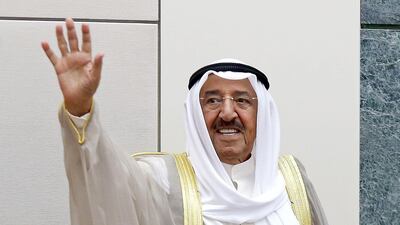The Emir of Kuwait has warned an escalation of the Qatar crisis could lead to the GCC's collapse and that unity is needed during this period of regional instability.
Sheikh Sabah, the ruler of Kuwait, has played chief mediator in the nearly five-months since four Arab countries cut diplomatic, trade and travel relations with Qatar over its support for extremist groups.
Saudi Arabia, the UAE, Bahrain and Egypt also accuse Qatar of providing a safe haven for figures and financiers linked to Islamist militancy and interfering in the affairs of other GCC states.
Speaking ahead of the opening of Kuwait's National Assembly, Sheikh Sabah began with a verse from the Quran that says to hold firmly to the rope of God all together and do not become divided. The verse highlighted his efforts to find a resolution to the dispute between Qatar and the four other Arab countries.
The emir, who has shuttled between the countries involved said “our only goal in mediation is to protect our Gulf home from collapse”.
“We are not a party in this, we are one part of two brothers,” he said. “Despite our hopes and desires, the crisis carries with it the possibility for development and we must be fully aware of the risks of escalation.”
___________________
Read more:
Kuwait faces tough test as it struggles to resolve Qatar crisis
Tillerson lands in Riyadh at start of Gulf, South Asia tour
Emir of Kuwait in Washington to discuss Qatar crisis
___________________
The annual GCC summit, scheduled for December, has reportedly been delayed until next year. Many were looking to the event as a chance for the two sides to begin dialogue.
The emir said that an escalation in the crisis could lead to regional and international repercussions that can “harm the Gulf and its peoples”.
Domestically, the emir assured citizens and reminded members of the National Assembly that the Kuwaiti constitution, which was drafted in 1962 and is the oldest in the Gulf, is of utmost importance.
“I am the protector of the constitution and I won’t allow prejudice because it’s the core protector of our nation, after God the Almighty,” he said.
The emir's address was followed by several members of parliament pledging more unity in a more functional National Assembly.
The emir has the authority to dissolve the elected 50-member parliament, something which has happened seven times since 2006.
Parliament enjoys legislative and monitoring powers, however the government is formed independently from the elected members and is usually headed by a member of the ruling family.
